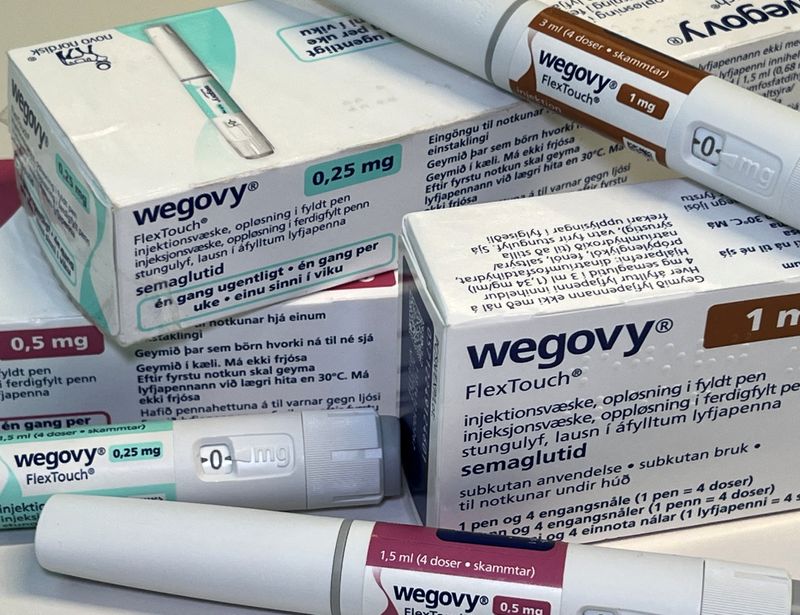By Patrick Wingrove
(Reuters) - More than 200,000 prescriptions for copies of Novo Nordisk (NYSE:NVO)'s weight-loss drug Wegovy are getting filled by U.S. patients each month, an industry group told the U.S. drugs regulator in a letter, saying it should consider their role in alleviating the obesity drug supply crunch before barring them.
The U.S. Food and Drug Administration is weighing whether to remove Wegovy from its shortage list, which has allowed compounding pharmacies to combine and mix copies of the highly sought-after drugs for more than a year.
Americans who cannot afford Wegovy or have struggled to find it have been turning to often-cheaper compounded versions sold by pharmacies and telehealth providers like Hims & Hers Health. Wegovy has been shown to help patients lose as much as 15% of their weight on average.
Once off the shortage list, the pharmacies could be forced to halt production, potentially pushing patients back to Novo, which has so far this year nearly tripled its weekly U.S. supply.
Monthly U.S. prescriptions of Novo's Wegovy are running about four times that of these compounders, based on member survey results from the Alliance for Pharmacy Compounding, which represents compounding pharmacists and technicians.
The survey results and the compounding industry's letter to the FDA have not been previously reported. The group said the count was likely conservative since not all members responded.
Novo Nordisk declined to comment. It has previously said it wants to ensure patients receive only FDA-approved, safe and effective semaglutide products, and has applied to the FDA to exempt the drug from U.S. regulations that allow it to be compounded.
The FDA said it was working to determine whether the demand or projected demand for semaglutide within the U.S. exceeds the available supply, and that while compounded drugs serve an important medical need for certain patients, they also present a risk because they are not approved by the agency.
In one of two letters to the FDA, the Alliance said it hoped the data illustrated the demand for semaglutide, and urged the FDA to consider the number of patients who would need to switch to branded versions when making determinations about the current shortage.
"There is all this demand that's not being (considered by) the FDA when it determines a shortage because none of these compounded prescriptions are reported anywhere," Tenille Davis, chief advocacy officer at the Alliance, told Reuters.
The survey had asked 200 members to disclose their dispensing data to show the FDA how compounded versions of semaglutide are helping supply meet demand.
Of those surveyed, 28 compounding pharmacies and affiliated telehealth providers said they were dispensing anything between 200 and 42,000 prescriptions of compounded semaglutide a month, according to the letters seen by Reuters.
Davis said she had seen several estimates for the size of the compounded semaglutide market but that the new data suggested it was "a lot bigger than even we expected" as there are many more than 28 compounding pharmacies in the U.S.
The group has not previously given a market estimate and Wall Street analysts have struggled to do so themselves because sales of compounded drugs are not tracked in traditional channels. Compounding pharmacies are mostly regulated by state pharmacy boards, though some of the larger ones also are overseen by the FDA.
In total, the 28 pharmacies surveyed fill 212,705 monthly prescriptions of the drug, although just five dispense more than three-quarters of those, according to the letters that did not disclose the pharmacies' names.
Novo Nordisk sold around 3.2 million combined prescriptions of Wegovy and Ozempic in the four weeks between Sept. 27 and Oct. 25, according to data from research firm IQVIA shared by a Wall Street analyst.
Rival drugs from Eli Lilly (NYSE:LLY) in the GLP-1 class, Zepbound for weight loss and Mounjaro for diabetes, were also in short supply this year, but were removed from the shortage list in October by the FDA.
The Outsourcing Facilities Association, another drug compounding industry group, sued the FDA a few days later, claiming the agency removed Lilly's drug from the list even though it remains in short supply.
That group also sent a letter to the FDA this month saying outsourcing facilities are currently supplying 2 million American patients with semaglutide "based on reports by market participants," although it did not provide a methodology.

Around 2.4 million prescriptions of Lilly's Zepbound and Mounjaro, both known chemically as tirzepatide, were sold in the same four weeks.
In its letters to the FDA, the Alliance also included screenshots of online order forms for branded Wegovy and Ozempic that showed several doses of the drugs were out of stock or in low supply at large wholesalers like McKesson (NYSE:MCK) and Cardinal Health (NYSE:CAH).